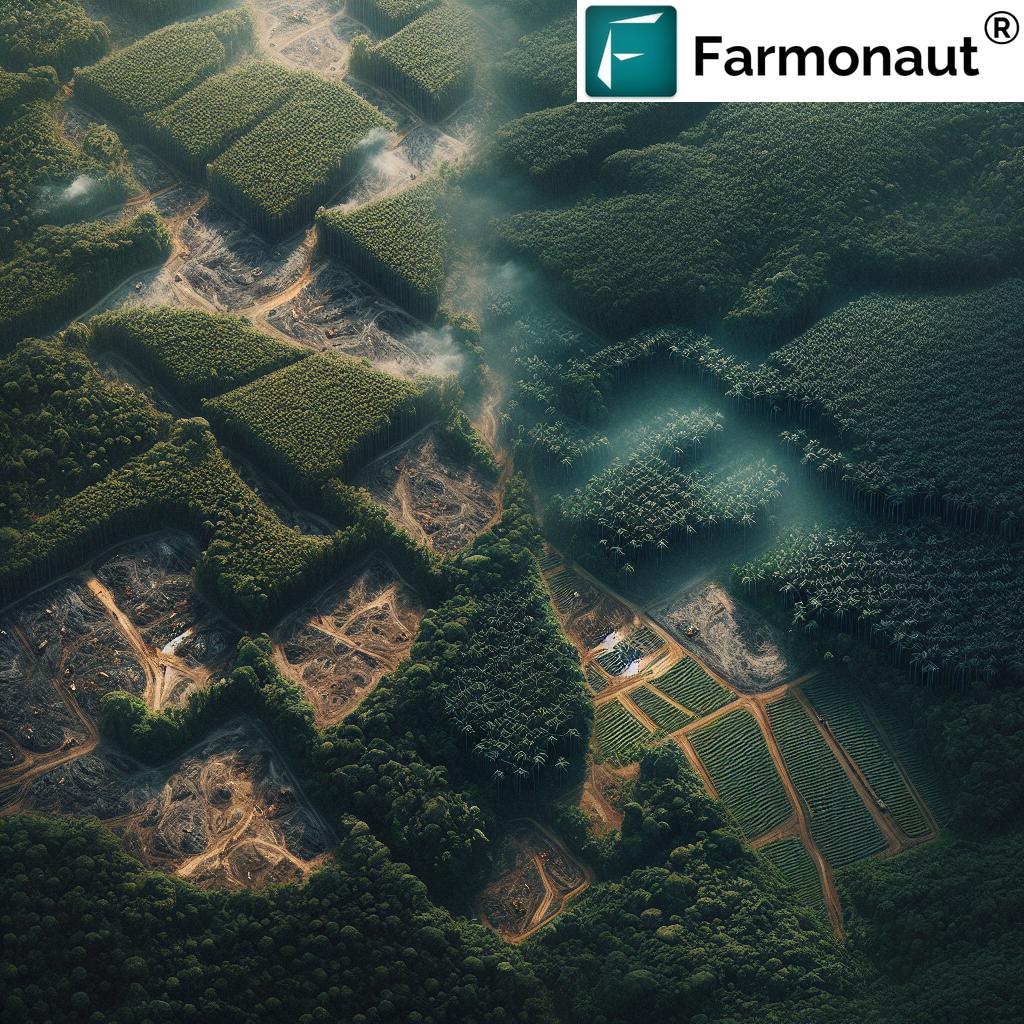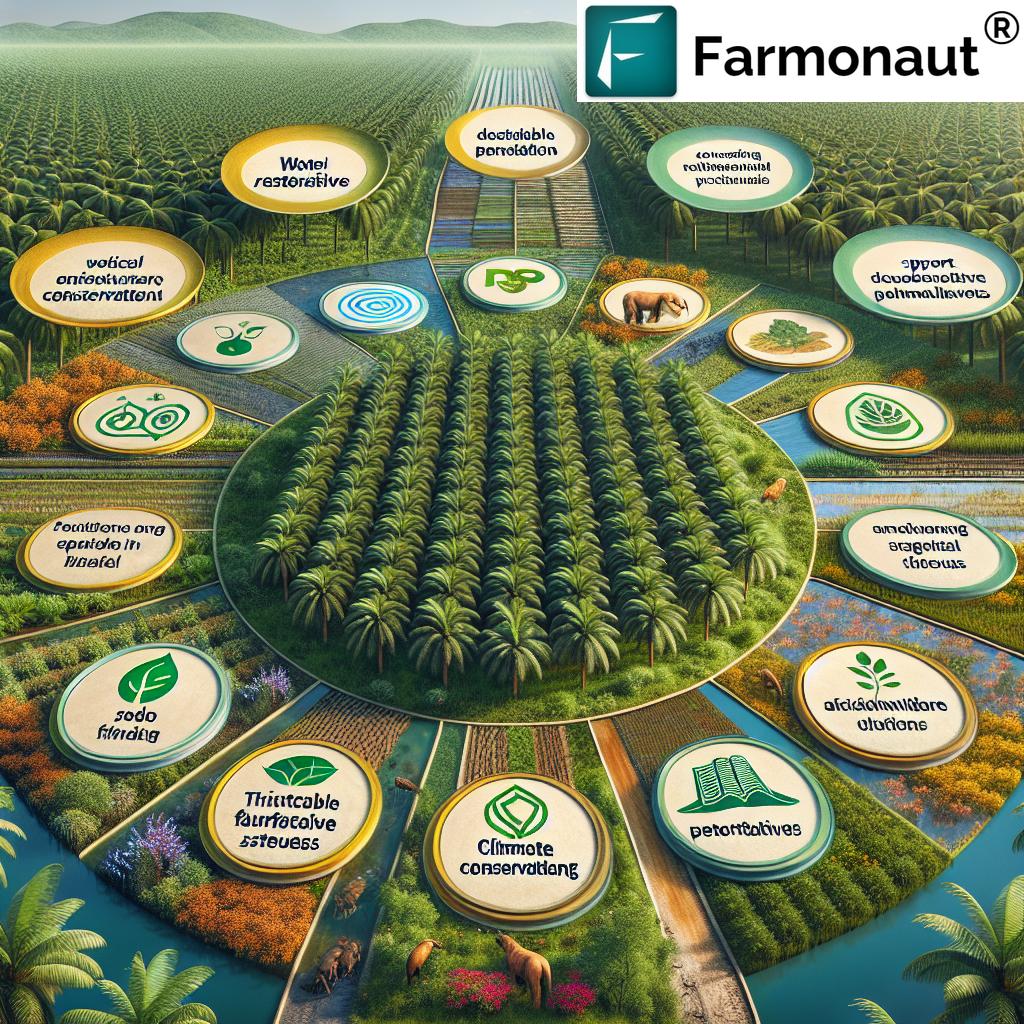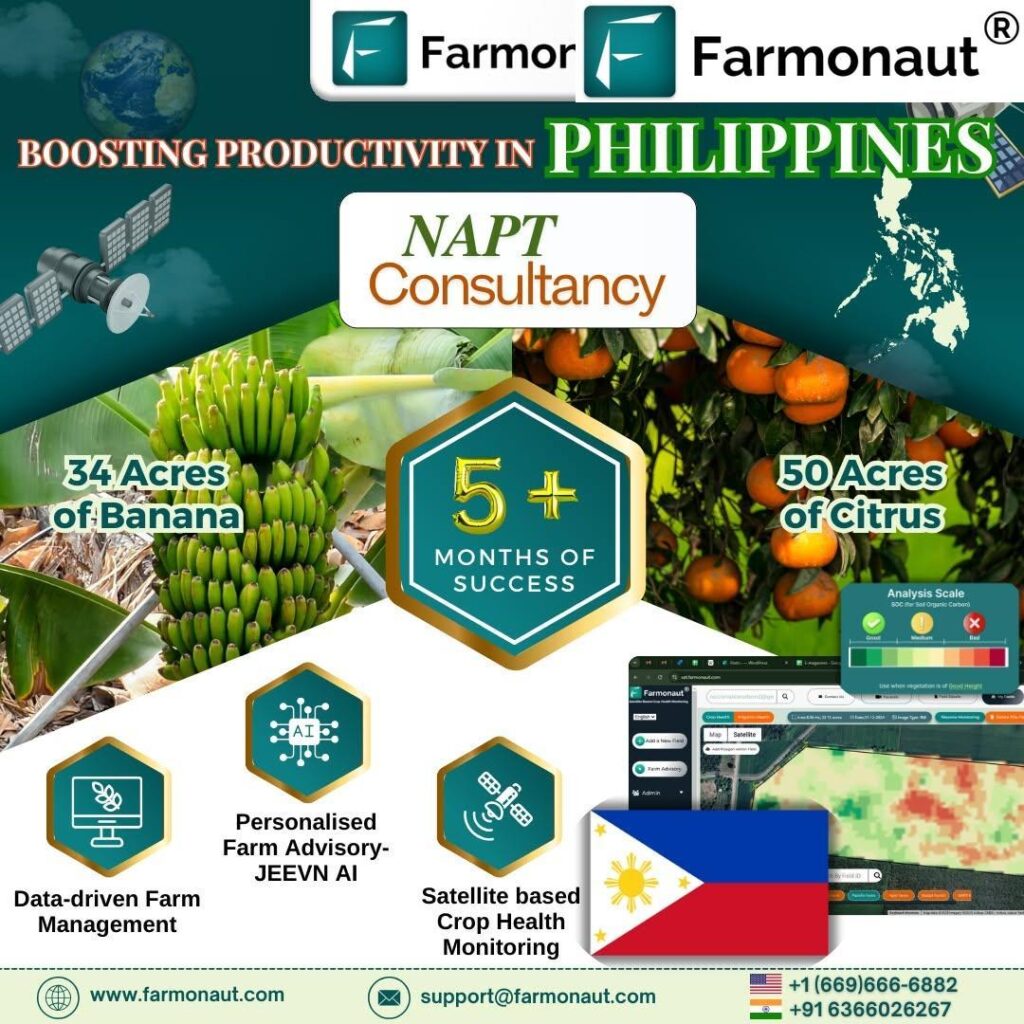Palm Tree Oil: 7 Impacts & Sustainability in Indonesia
“Indonesia produces over 55% of the world’s palm oil, making it the largest global supplier.”
Introduction
Palm oil, derived from the fruit of the oil palm tree (Elaeis guineensis), is a versatile and widely used vegetable oil essential in products ranging from food and cosmetics to biofuels. Its global production has surged, transforming it into a critical component of modern agricultural and forestry sectors. At the heart of this industry, Indonesia and Malaysia lead, accounting for almost 85% of world output.
However, the rapid expansion of oil palm plantations comes with significant environmental and social impacts. From deforestation and biodiversity loss to the challenges of balancing economic growth with sustainability, the palm oil debate is fierce and ongoing.
In this comprehensive guide, we explore the “7 Impacts” of palm oil production in Indonesia, analyzing environmental ramifications, social consequences, sustainable practices, and regulatory responses, and we examine how innovative tools (like Farmonaut’s advanced agricultural technology) can support a move towards sustainability.
Global Palm Oil Production & Economic Significance
As of 2023–2024, Indonesia produced 44 million tonnes of palm oil, while Malaysia contributed 19.7 million tonnes, jointly accounting for 85% of global palm oil output. This makes palm oil Indonesia’s foremost agricultural export and a key economic driver.
- Employment: The palm oil sector supports millions of jobs, with an estimated 30–40% grown by smallholders, providing income, infrastructure, and services in rural areas.
- Economies: The industry underpins rural economies, driving improvements in roads, schools, and healthcare.
- World Demand: High yield per hectare and versatility in products—from cooking oil to detergents—mean global demand continues to rise.
Despite these benefits, there is increased scrutiny of social and environmental impacts—especially regarding deforestation, biodiversity loss, labor issues, and sustainability.
Comparative Impact Table: Palm Oil in Indonesia
| Impact Area | Estimated Value/Extent | Brief Description |
|---|---|---|
| Deforestation | ► Over 24 million hectares lost (1990–2015) | Massive forest conversion to oil palm plantations, driving habitat loss and emissions |
| Greenhouse Gas Emissions | ► Peatland burning releases up to 1.1 Gt CO2/yr in SE Asia | Clearing/draining peatlands and forests for plantations releases large amounts of carbon dioxide and methane |
| Biodiversity Loss | ► 50–90% drop in local species; endangered tigers, orangutans | Displacement and extinction threat for numerous forest species |
| Economic Contribution | ► $20–25B annual value; millions employed | Major driver of Indonesia’s rural economies and global product supply |
| Community Livelihoods | ► 7 million+ rural Indonesians depend on palm sector | Income and infrastructure—offset by land rights/justice disputes |
| Water Use & Pollution | ► High; POME discharge, pesticide runoff | Potential for “dead zones” in rivers and lakes, affecting communities and aquatic life |
| Certification/Sustainability Progress | ► ~19% of global palm oil certified sustainable (2023) | RSPO/ISPO and other schemes promote better practices, still facing enforcement hurdles |
1. Environmental Impacts of Palm Oil: Deforestation, Biodiversity, Climate & Water
Deforestation and Palm Oil: The Conversion of Indonesia’s Forests
The conversion of tropical forests into oil palm plantations is a major global concern. Indonesia, home to some of the world’s most biologically rich rainforests, has lost over 24 million hectares to agriculture and palm oil expansion from 1990 to 2015 alone.
- The environmental impacts of palm oil include not only the destruction of forests but also heightened vulnerability to natural disasters like flooding and landslides, as root systems and canopy cover are removed.
- This deforestation and palm oil relationship has placed species and carbon sinks at risk while releasing vast stores of greenhouse gases.
- The ramifications go beyond ecology. Indigenous land rights, community livelihoods, and cultural heritage are also undermined.
Indonesia’s expansion in palm oil production is the world’s largest driver of tropical forest clearance, with grave implications for the global climate and biodiversity.
Palm Oil and Biodiversity Loss: The Decline of Species
As oil palm cultivation replaces primary forests, there is a significant loss of biodiversity. These plantations generally support only a fraction of the original species found in such forests—often just 10–20% of insects, birds, and mammals. Critically endangered species like the Sumatran tiger, orangutans, and Asian elephants are pushed to the brink of extinction as their habitats are destroyed.
- Ecosystems: Palm monocultures are far less diverse and resilient to pests, requiring increased use of fertilizers and pesticides that further stress local ecosystems.
- Functional Loss: The decline of keystone species threatens ecological balance and long-term resilience of Southeast Asia’s forests.
Climate Change and Palm Oil: Emissions, Peatlands, and Global Ramifications
A direct consequence of the environmental impacts of palm oil is greenhouse gas emissions, especially from peatland degradation. Peatlands in Indonesia store more carbon per unit area than any other ecosystem. When these are drained or burned for palm oil, massive amounts of carbon dioxide and methane are released, significantly contributing to global climate change.
- The burning and draining of peatlands can emit up to 1.1 gigatonnes of CO2 each year in Southeast Asia alone.
- Indonesia frequently experiences smoke haze crises due to peat fires, harming public health and neighboring economies.
Palm Oil, Water, and Ecosystems
Palm oil plantations are also linked to water pollution and ecosystem degradation. The discharge of palm oil mill effluent (POME) and runoff containing fertilizers or pesticides can create “dead zones” by depleting oxygen in rivers and lakes.
- Communities relying on natural water sources may face contaminated drinking water, fishing challenges, and health risks.
“Palm oil-driven deforestation in Indonesia destroyed over 24 million hectares of forest between 1990 and 2015.”
2. Social Impacts of Palm Oil Industry: Communities, Labor and Rights
It is important to highlight the social impacts of palm oil industry—for while palm oil underpins Indonesia’s economic viability, its growth has spurred significant challenges for local and indigenous communities.
Land Rights, Indigenous Communities, and Displacement
- Land Conflicts: Expansion of oil palm plantations often takes place on lands traditionally owned or used by indigenous communities. Insufficient consultation or compensation leads to disputes and, in many cases, displacement.
- Cultural Loss: Indigenous peoples risk losing not just their land, but their ancestral connection, traditions, and food security.
Learn more about how resource management platforms can help uphold transparency and better governance through blockchain-based product traceability.
Labor Conditions: Workers’ Rights, Child Labor, and Fair Wages
- Labor Abuses: Reports document incidences of forced labor and child labor within the palm oil sector.
- Fair Practices: Many plantations lack adequate controls to guarantee fair wages or the health and safety of workers. Securing labor rights is a paramount challenge for sustainable progress.
- Smallholder Support: About 7 million rural Indonesians depend on the palm sector, but many smallholders face barriers to equitable participation.
Modern technology (like satellite-powered farm management) can provide insights to improve transparency, resource allocation, and compliance—helping ensure social responsibility.
3. Sustainable Palm Oil Practices & Initiatives
In response to mounting concerns over environmental and social impacts, a range of initiatives and certification schemes aim to encourage sustainable palm oil practices:
RSPO, ISPO, and Certification
- The Roundtable on Sustainable Palm Oil (RSPO), founded in 2004, developed the world’s leading certification standard. Certified plantations must meet criteria for environmental protection, social responsibility, and economic viability.
- The Indonesian Sustainable Palm Oil (ISPO) is a national counterpart, focused on government standards.
- Despite progress, challenges persist—enforcement is inconsistent, clearing of HCV (high conservation value) forests is sometimes permitted, and peatland degradation remains insufficiently addressed.
- ~19% of global palm oil was RSPO-certified as sustainable by 2023.
Digital solutions like Farmonaut offer technologies (satellite monitoring, blockchain, resource management, and carbon footprinting) that can accelerate, verify, and improve sustainability efforts at scale.
If your agribusiness needs to comply with sustainability standards or demonstrate sustainable sourcing, carbon footprinting and fleet management solutions are available to assist you with emissions reporting and operational optimization.
Examples of Sustainable Practices
- No Deforestation, Peat, or Exploitation Commitments (NDPE): Many international buyers demand transparent, deforestation-free supply chains.
- Agroforestry & Buffer Zones: Integrating conservation areas and maintaining wildlife corridors within plantations.
- Improved Water & Waste Management: Upgrades to reduce pollution and increase efficiency.
- Smallholder Inclusion: Supporting community-led initiatives to improve livelihood and compliance.
4. Regenerative Agriculture Palm Oil: A Sustainable Path?
Regenerative agriculture palm oil refers to holistic practices that restore soil health, increase biodiversity, and reduce chemical use. In Indonesia, approaches like crop diversification, minimal tillage, cover cropping, and integrating livestock help protect vital forest ecosystems and improve smallholder resilience:
- Biodiversity: Planting native trees and maintaining natural vegetative buffers alongside oil palm to support insects, birds, and mammals.
- Carbon Sequestration: Regenerative approaches can enhance soil organic matter, helping to store more carbon per unit area.
- Resource Reduction: Lower use of chemical inputs and improved water management reduce impacts on people and nature.
- Farmer Livelihoods: Diverse income streams and improved soil health increase economic viability for farmers.
Learn how Farmonaut’s crop plantation and forest advisory tools leverage satellite, AI, and real-time weather data to help farmers transition to more sustainable agricultural models—improving both yields and long-term ecological health.
5. EU Deforestation Regulation Palm Oil & Global Policy Changes
Introduction to the EUDR
The European Union Deforestation Regulation (EUDR) takes effect at the end of 2024, requiring that all palm oil and other “forest-risk” commodities sold in the EU are verified as deforestation-free.
- Companies must provide traceable land coordinates and prove compliance, increasing transparency requirements across supply chains.
- Smallholders and exporters may face significant hurdles in documentation and cost.
- Non-compliance could block market access to EU customers.
Find out how robust, accessible API-based satellite monitoring and developer tools can help match requirements for geolocation tracking and environmental reporting.
Other National and International Initiatives
- Indonesian government policies target plantation moratoriums in protected areas, although enforcement varies.
- Multinational buyers employ “sourcing audits” and require RSPO or equivalent certification for suppliers.
- Global consumer pressure continues to shape industry practices, pointing toward the long-term need for both regulations and sustainability commitments.
Farmonaut’s Role in Advancing Sustainable Palm Oil & Agriculture
As the global palm oil industry evolves, digital transformation is essential. We at Farmonaut provide pioneering agricultural technology to help oil palm producers, managers, and communities meet modern sustainability standards while maximizing productivity and minimizing harm.
Our Value Proposition
- Satellite-Based Monitoring: We enable real-time, multispectral tracking of palm plantations, delivering insights into crop health, resource use, and risks (like encroachment, fires, or pest outbreaks).
- AI-Powered Advisory (Jeevn): Personalized weather forecasts and expert agronomic recommendations help farmers adopt best practices in irrigation, fertilizer management, and pest control, leading to optimal yields.
- Blockchain Traceability: Our platform helps palm oil producers and supply chain actors verify compliance (land use, labor practices) and share transparent data across the value chain.
- Resource and Carbon Footprint Tools: We offer solutions for monitoring emissions, reporting climate impact, and guiding decarbonization action plans.
- API Access and Scalability: Our robust APIs allow agribusiness, developers, and institutions to integrate advanced satellite and weather data for enterprise-scale management.
Explore Farmonaut’s suite of tools and see how precision monitoring, traceability, and sustainability analytics are transforming oil palm production in Indonesia and worldwide.
Recent Developments in Palm Oil Sustainability
- Can regenerative agriculture save Southeast Asia’s rainforests from palm oil?
- Nestle, P&G investigate palm oil sourcing after green group’s Indonesia deforestation report
- EU deforestation ban creates a hazy trade future
Farmonaut Subscription Plans
For growers, agribusinesses, governments, and institutions committed to sustainable practices, Farmonaut provides flexible, scalable subscription offerings. Access premium features for advanced crop monitoring, traceability, fleet/resource management, and more.
FAQ: Palm Oil, Sustainability, and Farmonaut Solutions
- What is palm oil and why is it in such high demand?
- Palm oil is a versatile vegetable oil derived from the fruit of the oil palm tree. It is used in food, cosmetics, detergents, and biofuels, making it a ubiquitous component in many products globally due to its high yield and low cost of production.
- What are the main environmental impacts of palm oil in Indonesia?
- The environmental impacts include large-scale deforestation, loss of biodiversity (affecting endangered species), greenhouse gas emissions from peatland burning, and water pollution from fertilizers and waste.
- How does palm oil production impact social and economic aspects?
- Palm oil provides vital income and supports rural economies, but its expansion has caused land conflicts, negative consequences for indigenous communities, and labor abuses.
- What sustainable palm oil practices are available?
- Implementation of certification schemes (RSPO, ISPO), commitments to deforestation-free sourcing, buffer zones, regenerative agriculture, fair labor standards, and transparent supply chains can make palm oil production more sustainable.
- What is regenerative agriculture and how can it improve palm oil’s footprint?
- Regenerative agriculture integrates soil restoration, biodiversity conservation, and responsible water management, improving long-term ecological resilience and livelihoods.
- How do international regulations like the EU Deforestation Regulation affect Indonesian palm oil?
- They require traceable, deforestation-free supply chains—encouraging industry-wide adoption of sustainable practices but also challenging smallholders to comply.
- How does Farmonaut support sustainability in palm oil production?
- Farmonaut provides satellite-based crop health monitoring, AI advisory, blockchain traceability, carbon footprint tracking, and resource management—empowering farmers, managers, and institutions to increase productivity and sustainability while demonstrating compliance with global standards.
Conclusion: Achieving a Sustainable Future for Palm Oil
Palm oil is undeniably crucial to the global economy—especially for Indonesia and Malaysia. Yet, the environmental impacts of palm oil, deforestation and palm oil links, social challenges, and regulatory shifts demand urgent, innovative responses.
A pathway forward requires balancing economic benefits with bold, science-based reforms and inclusive, sustainable approaches, including:
- Widespread adoption of sustainable palm oil practices (certification, regenerative agriculture, fair labor),
- Deeper traceability and digital monitoring, and
- Collaborative action between governments, industry, and civil society.
For all actors across the value chain—from smallholders to major producers and buyers—embracing responsible, transparent, and tech-enabled solutions like Farmonaut ensures a resilient, just, and sustainable palm oil sector for Indonesia and the world.
Explore more about crop plantation and forest advisory technology for sustainability and compliance in the palm oil industry by visiting
Farmonaut’s Farm Advisory Platform.














